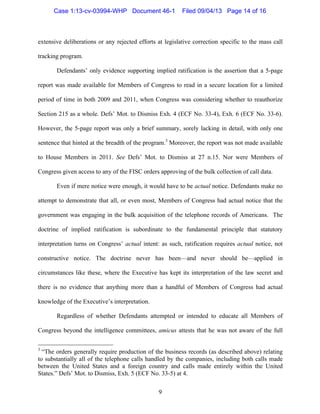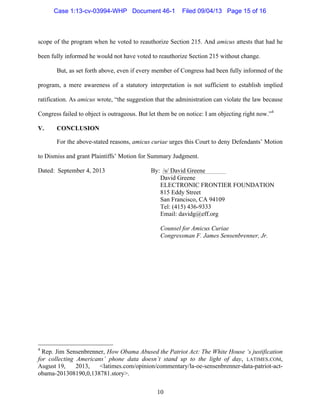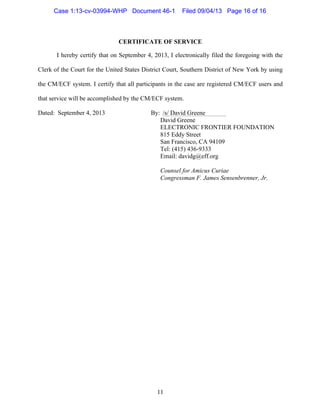- Congressman James Sensenbrenner, author of the Patriot Act, filed an amicus brief in support of plaintiffs challenging the NSA's mass telephone metadata collection program.
- He argues that Congress intended to authorize collection of documents and records only upon a showing of relevance to an authorized investigation, not a blanket collection of all telephone call records.
- Sensenbrenner also asserts that Congress did not intend to authorize indiscriminate collection of data on every telephone call to or from the US, which violates the privacy of millions of innocent Americans.
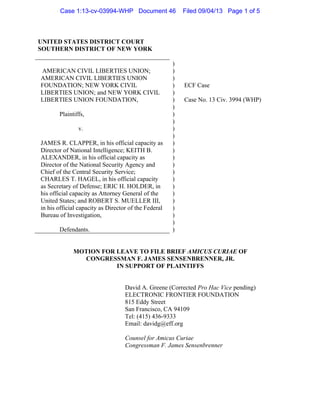
![1
Representative F. James Sensenbrenner, Jr. hereby moves for leave to file the
accompanying amicus curiae brief in the above-captioned case in opposition to Defendants’
Motion to Dismiss (ECF No. 33) and in Support of Plaintiff’s Motion for a Preliminary
Injunction (ECF No. 26). Both parties, through counsel, have consented to the filing of this brief.
Rep. Sensenbrenner has represented the Fifth Congressional District of Wisconsin since
1978. He is a long-serving member of the House Judiciary Committee and the Committee on
Science and Technology. Most pertinent to the above-captioned action, Rep. Sensenbrenner was
the author of the USA PATRIOT Act. Rep. Sensenbrenner was chairman of the judiciary
committee when the United States was attacked on September 11, 2001. Five days later, he
received a first draft of the USA PATRIOT Act from the Justice Department. Firmly believing
that that original draft went too far, he asked then-House Speaker Dennis Hastert for time to
redraft the legislation. Following numerous meetings and negotiations with the White House, the
FBI and the intelligence community, Rep. Sensenbrenner authored a revised version of the Act
that was ultimately the version adopted as law. Rep. Sensenbrenner also voted to amend the
Patriot Act in 2006 and voted to reauthorize certain provisions of the law, including Section 215,
in 2009 and 2011.
The fundamental standard for submission of an amicus brief is whether it “will aid in the
determination of the motion[] at issue.” James Square Nursing Home, Inc. v. Wing, 897 F. Supp.
682, 683 (N.D.N.Y. 1995) aff’d, 84 F.3d 591 (2d Cir. 1996). Among other helpful roles of amici,
[s]ome friends of the court are entities with particular expertise not possessed by
any party to the case. Others argue points deemed too far-reaching for emphasis
by a party intent on winning a particular case. Still others explain the impact a
potential holding might have on an industry or other group.
Neonatology Associates, P.A. v. C.I.R., 293 F.3d 128, 132 (3d Cir. 2002) (Alito, J.).
Case 1:13-cv-03994-WHP Document 46 Filed 09/04/13 Page 2 of 5](https://image.slidesharecdn.com/effdarrenchaker-150502134751-conversion-gate02/85/EFF_Brief_Darren_Chaker-2-320.jpg)
![2
Rep. Sensenbrenner can assist the court in reaching its decision on each of the pending
motions. Defendants have maintained in their Motion to Dismiss and are expected to maintain in
opposition to Plaintiffs’ Motion for Preliminary Injunction, that Congress in passing, amending
and reauthorizing Section 215 intended to authorize the Mass Call Tracking Program challenged
in this lawsuit. Rep. Sensenbrenner can offer his unique perspective on this issue.
The views of an amicus may align with those of one of the parties. Concerned Area
Residents for the Environment v. Southview Farm, 834 F. Supp. 1410, 1413 (W.D.N.Y. 1993),
quoting Hoptowit v. Ray, 682 F.2d 1237, 1260 (9th Cir. 1982) (“[T]here is no rule . . . that amici
must be totally disinterested.”). Indeed, in the origins of amicus briefing, an interest was
mandatory: the United States Supreme Court established a criteria for amici needing to be
“interested in some other pending case involving similar questions.” Northern Securities Co. v.
U.S., 191 U.S. 555, 24 S.Ct. 119, 48 L.Ed. 299 (1903) (rejecting brief because, inter alia, there
was no such interest).1
Moreover, although “[a]n amicus . . . is not a party to the litigation and
participates only to assist the court[, n]evertheless, ‘by the nature of things an amicus is not
normally impartial’ . . . and ‘there is no rule . . . that amici must be totally disinterested.’” Waste
Mgmt., Inc. v. City of York, 162 F.R.D. 34, 36 (M.D.Pa. 1995) (quoting United States v. Gotti,
755 F. Supp. 1157, 1158 (E.D.N.Y. 1991) and Concerned Area Residents for the Environment v.
Southview Farm, 834 F. Supp. 1410, 1413 (W.D.N.Y. 1993)).
For these reasons, Rep. Sensenbrenner respectfully requests that the Court grant this
motion for leave to file the accompanying amicus curiae brief.
1
Nor does an amicus need to show that a party is incompetently represented in order to
participate. Neonatology Assocs., 293 F.3d at 132 (“Even when a party is very well represented,
an amicus may provide important assistance to the court.”).
Case 1:13-cv-03994-WHP Document 46 Filed 09/04/13 Page 3 of 5](https://image.slidesharecdn.com/effdarrenchaker-150502134751-conversion-gate02/85/EFF_Brief_Darren_Chaker-3-320.jpg)
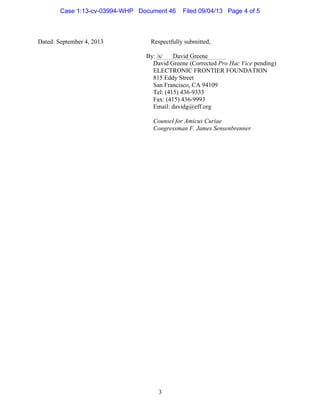
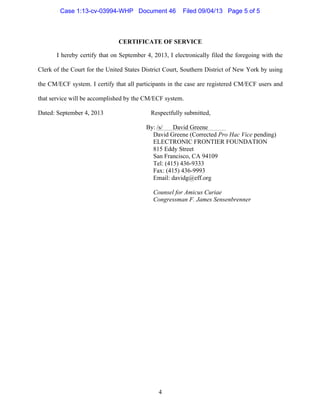
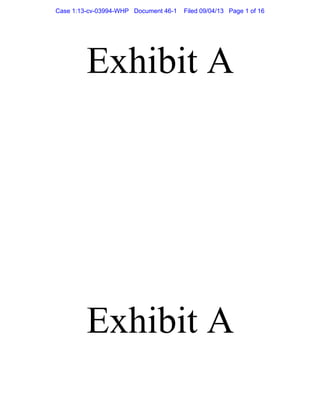
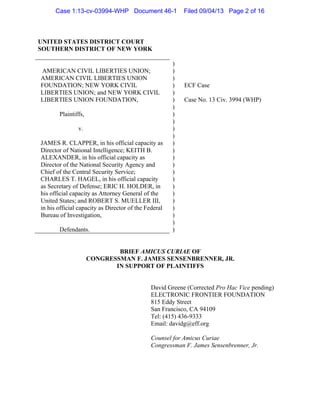
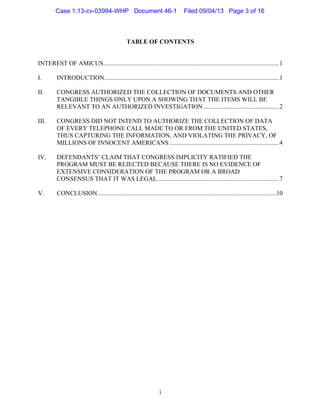
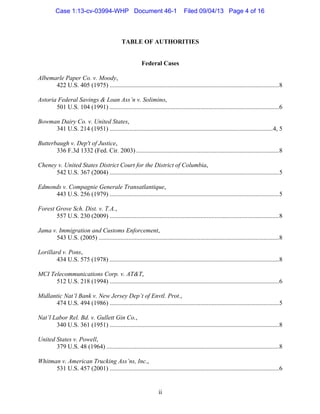
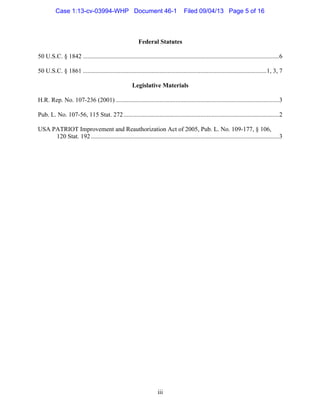
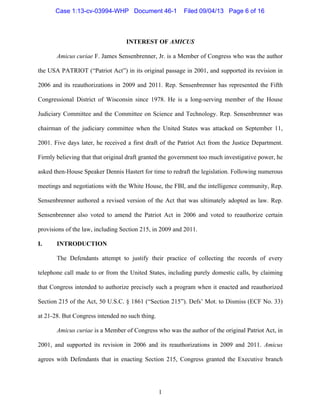
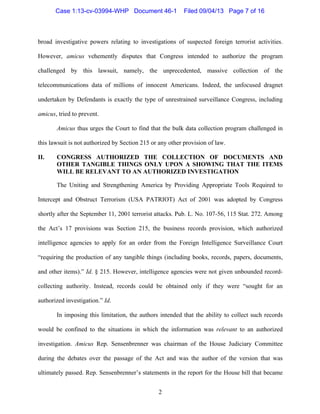
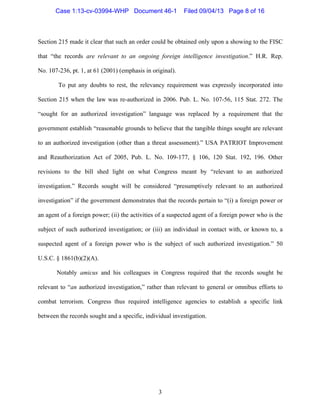
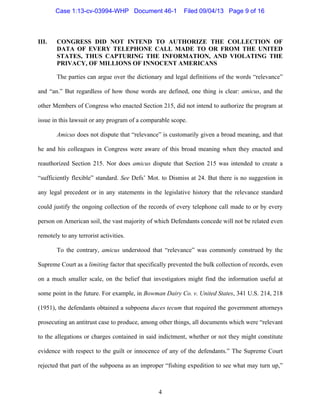
![5
despite the expansive reach of Federal Rule of Criminal Procedure 17(c). Id. at 221. In the civil
discovery context, the Supreme Court sharply criticized as “anything but appropriate” a
subpoena containing numerous “all documents” requests, characterizing it as seeking
“everything under the sky.” Cheney v. United States Dist. Court for the Dist. of Columbia, 542
U.S. 367, 387-88 (2004).1
In these and all other cases, the Court has looked at relevance in relation to the subject
matter at issue.2
But Defendants here, without citing to any supporting authority, offer an
unprecedented and dangerous version of “relevance”: records are also relevant “if there is reason
to believe [the business records] are necessary to the application of investigative techniques that
will advance its purposes.” Defs’ Mot. to Dismiss at 24. Thus, Defendants claim they can collect
millions of records that they know are not pertinent or related or connected to any terrorist
activities, and retain those records for five years, because it may be necessary at some point
within those five years to analyze those records to see if they contain any links to terrorists.
Defendants maintain this claim even though they concede that even third degree connections to
terrorists will be found in only a miniscule subset of the records collected. Defs’ Mot. to Dismiss
at 6 (“Therefore, ‘only a small fraction of the records are ever reviewed.’”) The vast majority of
the records collected will have no relation to the investigation of terrorism at all. This collection
of millions of unrelated records is built in to the mass call collection program.
1
The normal rule of statutory construction is that if Congress intends for legislation to change
the interpretation of a judicially created concept, it makes that intent specific.” Midlantic Nat’l
Bank v. New Jersey Dep’t of Envtl. Prot., 474 U.S. 494, 501 (1986) (quoting Edmonds v.
Compagnie Generale Transatlantique, 443 U.S. 256, 266-67 (1979)).
2
Defendants, quoting one dissenting senator, contend that Congress specifically rejected
proposals that would have required the records to be relevant to specific individuals suspected of
terrorist activities. Defs’ Mot. to Dismiss at 24 n.13. Regardless of whether this is true – the
words of the statute should be interpreted by what they say, not by what words were not
enacted – it is not support for Defendants’ theory that subject matter relevance, as distinct from a
connection to an individual terrorist, is not required.
Case 1:13-cv-03994-WHP Document 46-1 Filed 09/04/13 Page 10 of 16](https://image.slidesharecdn.com/effdarrenchaker-150502134751-conversion-gate02/85/EFF_Brief_Darren_Chaker-15-320.jpg)
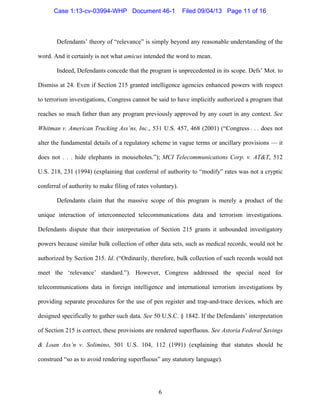
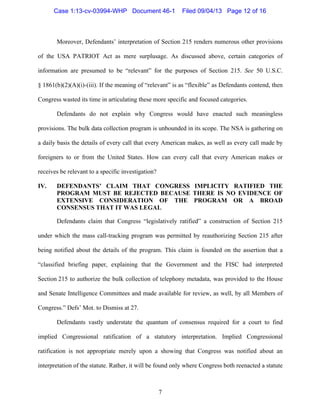
![8
without change, and did so where the specific interpretation of the statute was broad and
unquestioned. Jama v. Immigration and Customs Enforcement, 543 U.S. 335, 349 (2005); United
States v. Powell, 379 U.S. 48, 55 n.13 (1964). The required broad and unquestioned
interpretation may be established by evidence that “Congress considered [the interpretation] in
great detail,” Nat’l Labor Rel. Bd. v. Gullett Gin Co., 340 U.S. 361, 366 (1951), specifically
evidence of "[e]xtensive hearings, repeated efforts at legislative correction, and public
controversy.” Butterbaugh v. Dep’t of Justice, 336 F.3d 1332, 1342 (Fed. Cir. 2003). Or it may
be established by a broad unanimity of judicial decisions. In Jama, the Supreme Court declined
to find ratification even though Congress reenacted the legislation after two Court of Appeals
decisions had adopted the proposed interpretation; even in the absence of contrary authority,
those two appellate decisions could not establish the adequate judicial consensus needed for
implied Congressional ratification. Jama, 543 U.S. at 349. In contrast, in Forest Grove Sch. Dist.
v. T.A., 557 U.S. 230, 239-40 (2009), upon which Defendants base their ratification argument,
the Supreme Court found implied ratification only because Congress did not change a statutory
provision following the Supreme Court’s definitive interpretation of that provision in another
case. See also Lorillard v. Pons, 434 U.S. 575, 580 (1978) (finding ratification where “every
court to consider the issue” had interpreted the statute in the same way); Albemarle Paper Co. v.
Moody, 422 U.S. 405, 414 n.8 (1975) (finding ratification because “[t]he Court of Appeals that
have confronted the issue are unanimous”).
In this case there is no evidence to support implied ratification. The issue was not debated
in Congress, nor, because of the overwhelming secrecy the Executive applied to the legal
interpretations of FISA, were there public hearings or a public debate. There is no evidence of
Case 1:13-cv-03994-WHP Document 46-1 Filed 09/04/13 Page 13 of 16](https://image.slidesharecdn.com/effdarrenchaker-150502134751-conversion-gate02/85/EFF_Brief_Darren_Chaker-18-320.jpg)
